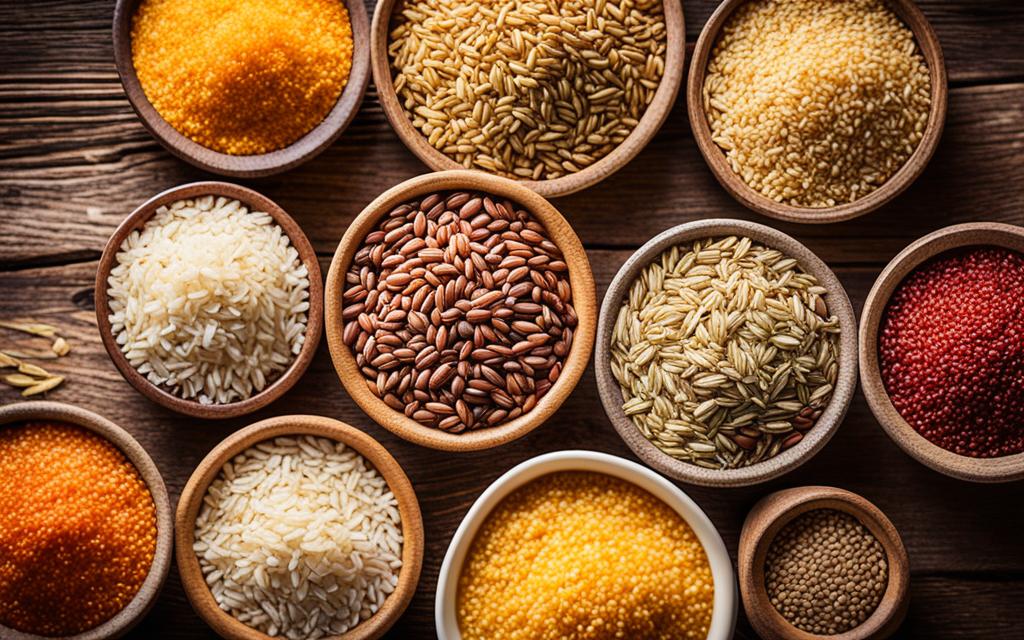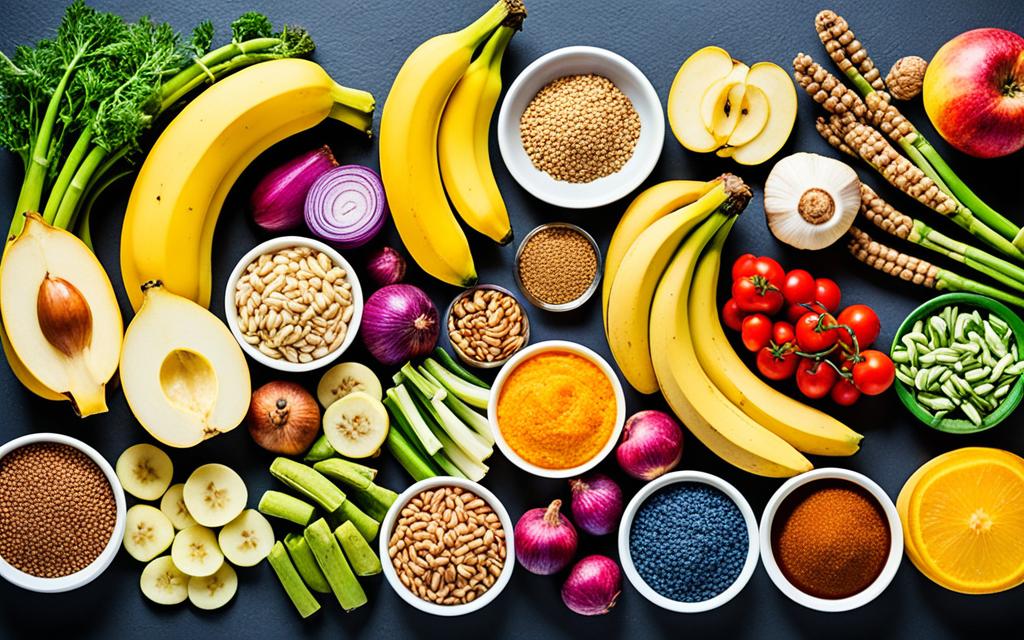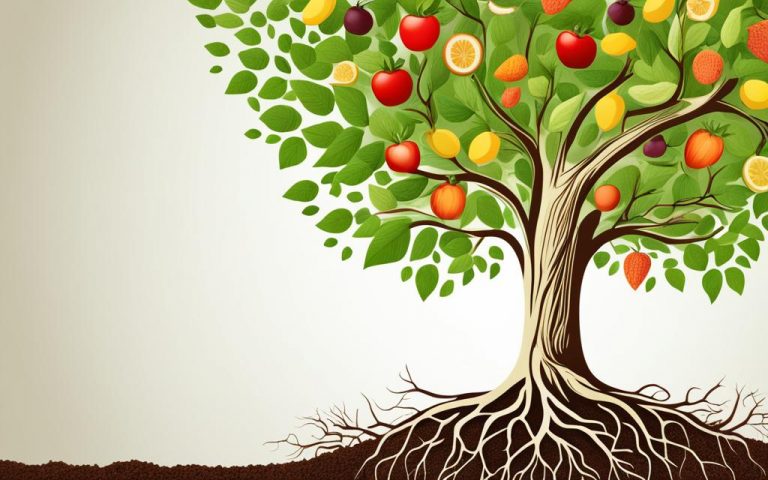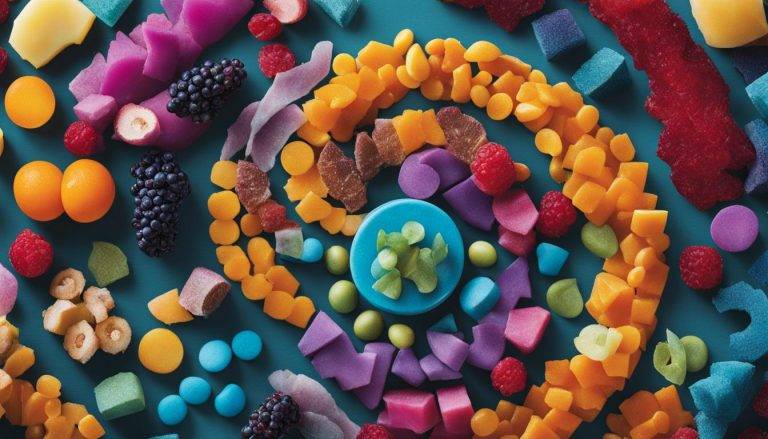The 10 Best Prebiotic Foods You Should Eat
Your gut health is vital for your well-being. Prebiotics are key for a healthy gut microbiome. They are plant fibers that feed good bacteria in your gut. This helps promote gut health and digestive wellness.
Including prebiotic foods in your meals offers many benefits. These include better digestion, more nutrient absorption, and a stronger immune system.
Let’s look at 10 prebiotic foods you should eat every day. These include tasty veggies and nutty whole grains. They not only taste good but also give your gut microbiome what it needs.
Key Takeaways
- Prebiotics are plant-based dietary fibers that nourish the beneficial bacteria in your gut.
- Incorporating prebiotic foods into your diet can promote gut health, improve digestion, and boost immunity.
- Onions, garlic, bananas, whole grains, asparagus, and fermented foods are excellent sources of prebiotics.
- Prebiotic supplements can be an alternative option for those who struggle to obtain enough prebiotics from dietary sources.
- A balanced diet rich in prebiotic foods can support a diverse and thriving gut microbiome.
Understanding Prebiotics and Their Importance
Prebiotics are a special kind of fiber. They’re not for us to digest, but for the good bacteria in our gut to feast on. These good bacteria, known as the gut microbiome, help keep our digestive system healthy.
What Are Prebiotics?
Prebiotics are like carbs that our bodies can’t break down. They move to our large intestine whole. There, they feed the good bacteria found in our gut such as Bifidobacteria and Lactobacilli.
The Role of Prebiotics in Gut Health
A strong gut microbiome is crucial for good gut health and overall health. Prebiotics fuel the good bacteria in our gut. These bacteria then make short-chain fatty acids, which are really good for our digestion and immune system.
Benefits of Incorporating Prebiotics into Your Diet
Eating foods rich in prebiotics can do a lot of good. Here are some benefits:
- Make your digestion better and more regular
- Help you absorb nutrients better
- Boost your immune system
- Lower the chance of some digestive issues
- May help with weight control
Prebiotics are key to a happy gut and diverse gut bacteria. They keep us healthy. Adding prebiotic-rich food to a mostly plant-based diet is great for your gut and digestion.
The 10 Best Prebiotic Foods You Should Eat
Adding prebiotic foods to your meals is vital. It helps your gut health and digestive wellness. Prebiotics are a form of dietary fiber. They act as food for the good bacteria in your gut, which in turn helps these bacteria grow. This process results in a well-balanced gut microbiome. By supporting the growth of beneficial bacteria, prebiotics lead to better digestion, increased nutrient absorption, and a stronger immune system.
Below, we list the top 10 prebiotic foods for you to consider. These items, ranging from veggies to grains to fruits, are rich in nutrients. They boost your digestive wellness while making your meals more diverse and delicious.
Including a wide range of prebiotic foods in your meals is key. It helps maintain a healthy gut microbiome and brings about several prebiotic benefits for better health.
In upcoming sections, we’ll cover each prebiotic food in detail. We’ll discuss their nutritional value, prebiotic content, and how to add them to your daily diet. So, let’s explore the journey to better gut health and digestive wellness together with these great prebiotic foods.
Onions and Garlic: Flavorful Prebiotic Powerhouses
Onions and garlic don’t just add taste to food; they are powerful prebiotics too. They are high in inulin, a prebiotic fiber that helps our gut’s good bacteria. This makes them great for our health.
Nutritional Profile of Onions and Garlic
These foods are low in calories but full of good stuff like vitamins and minerals. They have a lot of vitamin C, vitamin B6, and manganese. Their special smell and taste come from sulfur compounds.
Prebiotic Content and Effects on Gut Health
Onions and garlic stand out because they are prebiotics. Inulin in them helps good bacteria in our gut grow. This is key for staying healthy.
Eating them often can make our gut healthier. It does this by adding to the good bacteria and fighting inflammation. Also, their prebiotic effects help with weight, nutrient absorption, and fighting diseases.
Adding onions and garlic to your plant-based meals is good for your gut and tastes great too.
Here are ways to get the most out of onions and garlic:
- Choose fresh onions and garlic whenever you can.
- Add them to many dishes, like stir-fries, soups, salads, and marinades.
- Cook them lightly to keep their prebiotics and taste.
- Try different kinds, like red or yellow onions and elephant or pearl garlic, for more flavors and nutrients.
By eating onions and garlic regularly, you boost your health. They are not just tasty but also help your digestion and keep you healthy.
Bananas: A Sweet and Prebiotic-Rich Treat
Bananas are known for their sweet taste and bright yellow color. They are much more than just a snack. Bananas are full of prebiotics, especially resistant starch. This type of fiber is good for your gut and digestion.
Resistant Starch: A Prebiotic Superstar
Resistant starch is a special kind of fiber. It doesn’t get digested in the small intestine. Instead, it goes to the colon. There, it feeds the good bacteria. This helps them grow, which is good for your gut health.
Green bananas have the most resistant starch. But even ripe bananas have some. So, no matter when you eat your banana, it’s still a good prebiotic food.
Practical Tips for Incorporating Bananas
Adding bananas to your diet is simple and tasty. Here’s how:
- Blend a banana in your morning smoothie with yogurt or spinach.
- Grab a banana as a snack, along with nuts or nut butter.
- Top your cereals, oatmeal, or yogurt with sliced bananas.
- Bake banana bread or muffins with ripe bananas for a treat.
Bananas go beyond being just a fruit. They are rich in prebiotics, thanks to resistant starch. By eating them often, you help keep your gut healthy.
Whole Grains: Fiber-Packed Prebiotic Gems
Whole grains are packed with nutrients. They are a key part of a plant-based diet. Their prebiotic content is especially important for gut and digestive health.
Oats: A Versatile and Prebiotic-Rich Grain
Oats are loved for their high prebiotic content. They’re full of beta-glucan, a soluble fiber that feeds good gut bacteria. Including oats in your meals supports a healthy gut and digestion.
Oats can be used in many ways. Try oatmeal, granolas, or use oat flour in baking. You can also add oats to yogurt, smoothies, or salads for extra prebiotic fiber.
Barley: Another Whole Grain Prebiotic Powerhouse
Barley, like oats, is rich in beta-glucan. It’s a strong prebiotic that helps your gut’s beneficial bacteria thrive. This grain supports digestion and a balanced gut microbiome.
Use barley in soups, stews, or as a base for grain bowls. Pearl barley, with its chewy texture and nutty taste, is great in salads, pilafs, and baked goods.

Choosing whole grains like oats and barley is smart. They offer more than just prebiotics. You also get fiber, vitamins, and minerals. These foods play a big role in keeping your gut and body healthy.
Asparagus: A Nutrient-Dense Prebiotic Vegetable
Asparagus is versatile and full of nutrients that are great for you. It has a lot of fiber, perfect for helping the good bacteria in your gut grow. This makes it a key part of a healthy diet.
Inulin: The Prebiotic Fiber in Asparagus
Inulin is a type of fiber that feeds the good bacteria in your stomach. It helps keep your digestive system healthy. Asparagus has a lot of this fiber, making it excellent for your gut.
Eating asparagus helps good gut bacteria grow. This can mean better digestion and overall health. Plus, it might lower your chances of getting certain diseases, studies show.
Cooking and Preparation Tips for Asparagus
To get the most from asparagus, you need to cook it right. Here are some tips:
- Steam or lightly sauté asparagus to keep its good stuff.
- Don’t cook it too much. You could lose its important prebiotics.
- Eat asparagus raw in salads or as a snack for a healthy gut.
- Try grilling or roasting it with herbs and lemon for more flavor.
Adding asparagus to your meals is a smart move for a healthy gut. Its rich flavor and versatility make it a top choice. It fits well into diets that focus on being good for your digestion.
Chicory Root: An Underrated Prebiotic Superfood
Chicory root is often missed when talking about prebiotic foods. This humble vegetable is actually a prebiotic powerhouse. It’s great for your gut health and digestive wellness.
This root is full of inulin, a soluble dietary fiber. Inulin serves as a prebiotic, feeding good bacteria in your gut. This helps your body digest better, absorb nutrients more efficiently, and strengthens your immune system.
Adding chicory root to your plant-based diet is easy and tasty.You can use it in many ways, for example:
- Roasted chicory root chips for a crispy snack
- Chicory root coffee, a healthy, caffeine-free choice
- Chicory root powder in your smoothies or treats
- Sautéed or roasted chicory root as a dish or salad topping
Chicory root brings flavor and nutrition to your meals. It’s a fantastic choice for your gut health.
Don’t overlook chicory root anymore. Start using this amazing vegetable and feel your gut getting healthier.
| Nutrient | Amount per 100g |
|---|---|
| Inulin (Prebiotic Fiber) | 15-20 grams |
| Protein | 3.6 grams |
| Vitamin B6 | 0.2 milligrams |
| Manganese | 0.8 milligrams |
Fermented Foods: Prebiotic and Probiotic Powerhouses
Fermented foods like yogurt and kefir are great for your gut. They offer both prebiotics and probiotics. These foods are flavorful and help with digestive wellness and gut health.
Yogurt: A Delicious Source of Prebiotics and Probiotics
Yogurt is a popular fermented food. It has both prebiotics and probiotics. The fermentation process gives yogurt its tangy taste. It adds probiotic cultures, which are good bacteria for your gut. Yogurt also has prebiotic fibers that feed these friendly bacteria.
Kefir: A Probiotic-Rich Beverage with Prebiotic Benefits
Kefir is another great option. It’s a tangy beverage from Eastern Europe. It is rich in probiotic bacteria and yeast strains. These are beneficial for your digestive system. Kefir also has prebiotic fibers. These help the probiotics grow, keeping a healthy balance in your gut.
Eating foods like yogurt and kefir is good for your plant-based diet. They offer many prebiotic benefits. Make sure to choose ones with low sugar and no preservatives. This will give you the most nutrition.
Remember, a balanced gut is the foundation for optimal digestive wellness. Using fermented foods can help. They provide both prebiotics and probiotics in a tasty mix.
Prebiotic Supplements: An Alternative Option
Eating foods rich in prebiotics is the best way to help your gut microbiome and improve digestive wellness. But, some people might not get enough prebiotics from food alone. This is where prebiotic supplements are very helpful.
Types of Prebiotic Supplements
Prebiotic supplements usually come from plants. They can be powders, capsules, or even gummies. The two main prebiotics found in these supplements are:
- Inulin: It’s a soluble fiber from plants like chicory root and some fruits. It’s great for good gut bacteria.
- Galacto-oligosaccharides (GOS): These come from the natural sugar in milk. They help grow good gut bacteria.
Choosing the Right Prebiotic Supplement for You
Picking the right prebiotic supplement is important. Here’s what to think about:
| Factor | Consideration |
|---|---|
| Desired Benefits | Think about what you want to achieve. This could be better digestion, a stronger immune system, or managing health issues. |
| Prebiotic Type | Each prebiotic helps the gut in different ways. You might want to check with a doctor to see what’s best for you. |
| Dosage | Always follow the dosage instructions. Too much can cause stomach troubles or other problems. |
| Quality and Safety | Look for supplements from well-known brands. They should be tested to make sure they’re safe and effective. |
Adding prebiotic supplements to your diet can do a lot for your gut health. It helps by targeting the growth of good bacteria. But before you start, it’s smart to talk to a doctor.
Conclusion
We’ve gone deep into understanding how prebiotic foods can greatly benefit our gut health and digestive wellness. We’ve learned about the benefits of fiber-rich whole grains such as oats and barley. We’ve also explored how asparagus and chicory root support our gut microbiome in unique ways.
Choosing a plant-based diet focused on these prebiotics can help us build a healthy gut. This diet supports the good bacteria in our gut. It also shows how prebiotics can work with probiotics found in yogurt and kefir, benefiting our entire digestive system.
Options like onions and garlic, bananas, or even prebiotic supplements can guide us to better gut health. Adding prebiotic foods to our meals each day can lead to better dietary fiber absorption. It also supports general health by boosting nutrient intake.
FAQ
What are prebiotics?
Prebiotics are like food for the good bacteria in your gut. They are a type of fiber. By eating prebiotics, you help these good bacteria grow. This is great for your gut and overall health.
Why are prebiotics important for gut health?
Prebiotics are key for a healthy gut. They are food for the microbes in your intestines. By feeding the good bacteria, they support a healthy gut environment. This balance helps with better digestion, boosts your immune system, and lowers digestive issues.
What are some of the best prebiotic foods?
Onions, garlic, bananas, and whole grains like oats are great prebiotic foods. So are barley, asparagus, and chicory root. Fermented foods like yogurt and kefir are also good choices. These foods are full of the fiber that good gut bacteria love.
Can prebiotics be found in supplements?
Yes, you can get prebiotics in supplement form. They usually have inulin or galacto-oligosaccharides. For some people, supplements are an easy way to ensure they get enough prebiotics.
How can I incorporate more prebiotics into my diet?
Add more prebiotic foods to your meals. This includes foods like onions, bananas, and whole grains. You can also try recipes that are rich in prebiotics. Ideas include roasted garlic, banana smoothies, and overnight oats.
Another fun idea is making probiotic yogurt parfaits.
Are there any side effects associated with consuming prebiotics?
For most people, prebiotics cause no harm. But, some might feel a bit bloated or gassy at first. If this happens, just start with small amounts and slowly eat more. Your body will adjust over time.







